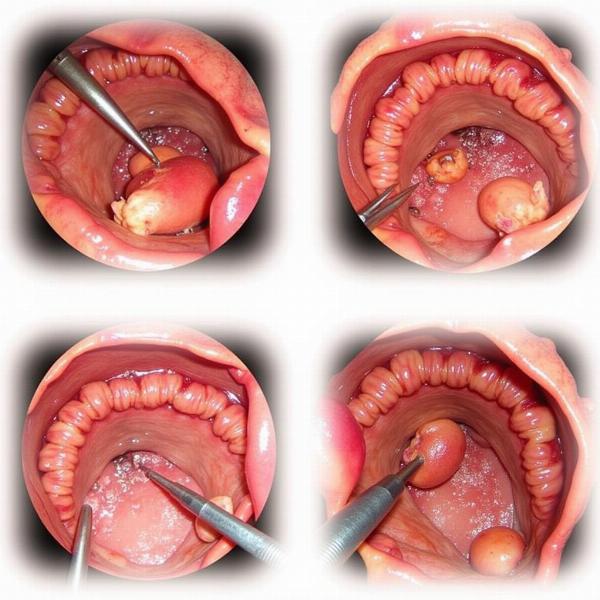Polyps, small growths on mucous membranes, are a common medical concern. Understanding what “polypi” means in Hindi is crucial for effective communication with healthcare professionals, especially for those living in India. This article delves into the meaning, types, symptoms, diagnosis, and treatment options related to polypi, offering a comprehensive guide in clear, accessible language.
What Does Polypi Mean in Hindi?
In Hindi, polypi are generally referred to as नासिका में मस्से (nasika mein masse) or पॉलिप (polip). While नासिका में मस्से literally translates to “warts in the nose,” it’s commonly used to describe nasal polyps specifically. The term पॉलिप is a transliteration of the English word “polyp,” often used in medical contexts. Understanding these terms helps in navigating conversations with doctors and pharmacists in Hindi-speaking regions.
Types of Polyps and Their Significance
Polyps can occur in various parts of the body, including the nose, colon, uterus, and stomach. Each type has unique characteristics and implications. Nasal polyps, often linked to allergies or chronic inflammation, can cause breathing difficulties and reduced sense of smell. Colonic polyps, on the other hand, can be precancerous and necessitate regular screening. Understanding the specific type of polyp is crucial for appropriate management.
Recognizing Polyp Symptoms
Symptoms of polyps vary depending on their location and size. Nasal polyps can manifest as nasal congestion, runny nose, decreased sense of smell, facial pressure, and snoring. Colonic polyps often have no noticeable symptoms but can sometimes cause rectal bleeding. Uterine polyps may lead to heavy menstrual bleeding or infertility. Being aware of these potential symptoms facilitates early diagnosis and treatment.
Diagnosing and Treating Polyps
Diagnosing polyps typically involves a physical examination and imaging tests, such as a CT scan or MRI. For nasal polyps, a nasal endoscopy may be performed. Colonic polyps are often detected during a colonoscopy. Treatment options depend on the type, size, and location of the polyp. Nasal polyps can be managed with medications like nasal corticosteroids or surgery. Colonic polyps are usually removed during a colonoscopy.
Polyp Prevention and Long-Term Management
While not all polyps can be prevented, certain lifestyle changes can reduce the risk. For example, managing allergies and avoiding irritants can help prevent nasal polyps. A diet rich in fruits, vegetables, and fiber can lower the risk of colon polyps. Regular screenings are essential for early detection and prompt management of polyps, particularly colonic polyps.
What is the most common type of polyp?
Nasal polyps are among the most common types.
Are all polyps cancerous?
No, not all polyps are cancerous. Many are benign, but some can become cancerous over time.
How are polyps removed?
Removal methods vary depending on the location and type of polyp. Common procedures include polypectomy during a colonoscopy or surgery for nasal polyps.
 Polyp Removal Procedure
Polyp Removal Procedure
Conclusion
Understanding “polypi meaning in Hindi” and the related medical information is essential for effective healthcare communication. This guide provides a detailed overview of polyp types, symptoms, diagnosis, and treatment options. Early detection and appropriate management are crucial for preventing complications and ensuring optimal health outcomes.
FAQ
- What does “polyp” mean in simple terms? A polyp is a small, abnormal tissue growth that projects from a mucous membrane.
- Are polyps painful? Not all polyps cause pain. Some may be asymptomatic, while others can cause discomfort depending on their location and size.
- When should I see a doctor about polyps? Consult a doctor if you experience symptoms like persistent nasal congestion, rectal bleeding, or changes in bowel habits.
- Can polyps be treated without surgery? Some polyps, like nasal polyps, can be managed with medication. However, larger or potentially cancerous polyps often require surgical removal.
- How can I prevent polyps? While not all polyps are preventable, maintaining a healthy lifestyle, managing allergies, and undergoing regular screenings can reduce the risk.
- What are the long-term implications of untreated polyps? Untreated polyps can lead to complications such as breathing difficulties, chronic sinusitis, or even colon cancer in some cases.
- Where can I find more information about polyps? Reputable medical websites and healthcare professionals can provide further information and guidance on polyps.
Meaning-Hindi.in is your trusted partner for accurate and culturally sensitive Hindi translation services. We specialize in various translation domains, including business, legal, technical, website localization, and more. Our team of expert linguists ensures high-quality translations that bridge language barriers and facilitate effective communication. Contact us today for all your Hindi translation needs! Email: [email protected], Phone: +91 11-4502-7584. Let Meaning-Hindi.in help you connect with your Hindi-speaking audience.